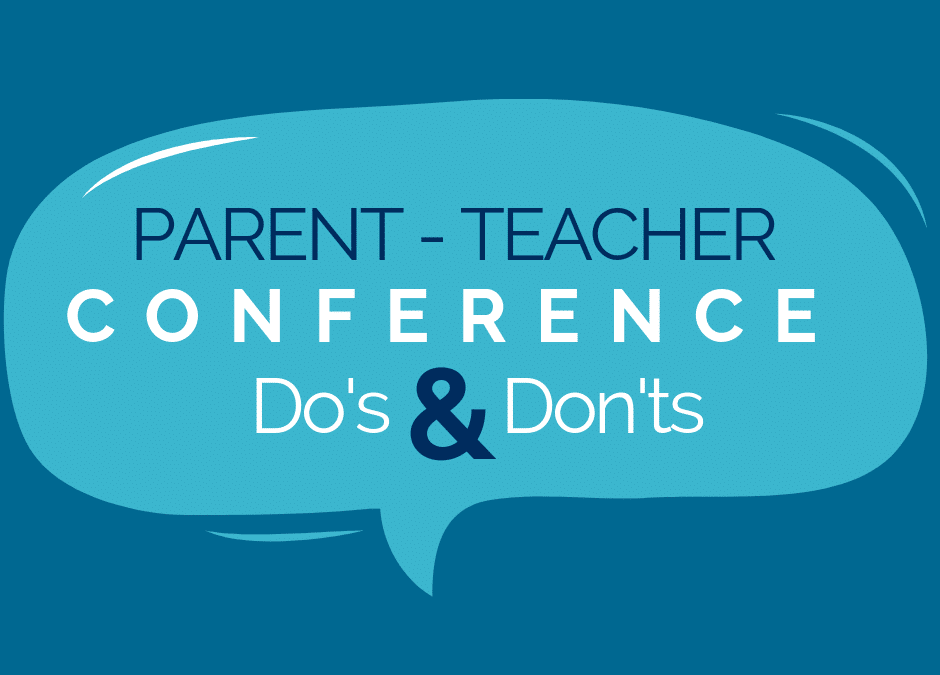It’s time again to meet with parents and guardians of your students one-on-one during parent-teacher conferences. You may have had interactions with students’ families before, but this time, it’s a little more serious. Unfortunately, you may only have 15 minutes to discuss student progress. These time constraints can make conference time stressful for teachers. Be prepared and make your conferences meaningful by using our quick parent-teacher conferences guide.
Parent-Teacher Conferences – Do’s & Don’ts
Do:
- Share specific examples of student work or behavior. If a student is struggling with a concept or in a subject area, provide “evidence.”
- “Sandwich” negative information. Start with positive information, share the negative, and end with another positive.
- Ask parents to share concerns prior to their conference. If you have this information ahead of time, you will be better prepared to answer questions during the conference.
- Be tactful. Communicate any concerns with clarity but also with sensitivity.
- Display student work. Parents like to see what students are working on.
- Hang a sign outside your door indicating a conference is taking place. I like to add a note that invites parents to knock quietly on the door if their conference time has arrived.
- Provide a comfortable, welcoming environment. I always have a few things on the table during conferences: tissues, pens and pencils, sticky notes, candy, and breath mints. I also like to play light, classical music in the background. To make the room smell “home-y,” I use plug-in air-fresheners, scented wax warmers, or candles. In the hallway, I place chairs, children’s books, blocks, and other toys to keep little ones busy while their parents are waiting.
- Emphasize the positive. Show parents you really know and care about their students by providing some examples of student strengths.
- Keep the focus on the student. Your time is limited. Veering off topic isn’t productive.
- Recommend resources. Have a handout prepared that includes resources for all students (websites, apps, books, activities, etc.).
Don’t:
- Sit behind your desk. It can make some parents uncomfortable and makes you look inaccessible. Instead, sit at a table in the classroom and provide plenty of chairs. Sitting on the same side of the table sends the message that you want to work WITH parents.
- Tell parents what they should or shouldn’t do. Provide specific suggestions.
- Do all of the talking. Invite parents to ask questions and provide feedback.
- Speak using educational jargon. Use everyday language and avoid acronyms, euphemisms, and professional terms.
- Provide too many suggestions for student improvement. It can be overwhelming for parents. Focus on a few things for a student to work on.
- Forget to invite all parents/guardians to the conference. You don’t have to conduct separate meetings for each set of parents (unless you want to). Share with families that conference slots are limited and that meeting together will allow other families to sign up for a conference.
- Forget the data! Whether it’s your computer, a student data folder, or printed test results, keep it handy for easy access during a conference. Seeing a student’s progress in graph form can be helpful for parents.
- Make assumptions. If you speculate about what happens outside of school, you create a tense atmosphere and parents may feel defensive.
Our Education Blogger is a public school teacher with over a decade of experience. She’s an active NEA member and enjoys writing about her experiences in the classroom.
While you’d prefer to have a fantastic relationship with the parents or guardians of every one of your students, we know it isn’t always possible. Be sure to check out How Educators Can Deal With Difficult Parents for some helpful tips on handling difficult situations.
This article is furnished by California Casualty, providing auto and home insurance to educators, law enforcement officers, firefighters and nurses. Get a quote at 1.866.704.8614 or www.calcas.com.
- California Casualty Earns Financial Stability Rating® of A, Exceptional, From Demotech, Inc. - April 28, 2025
- Music & Arts Grant Recipients – 2024 - December 13, 2024
- Understanding Auto and Home Insurance Rate Changes - December 3, 2024

